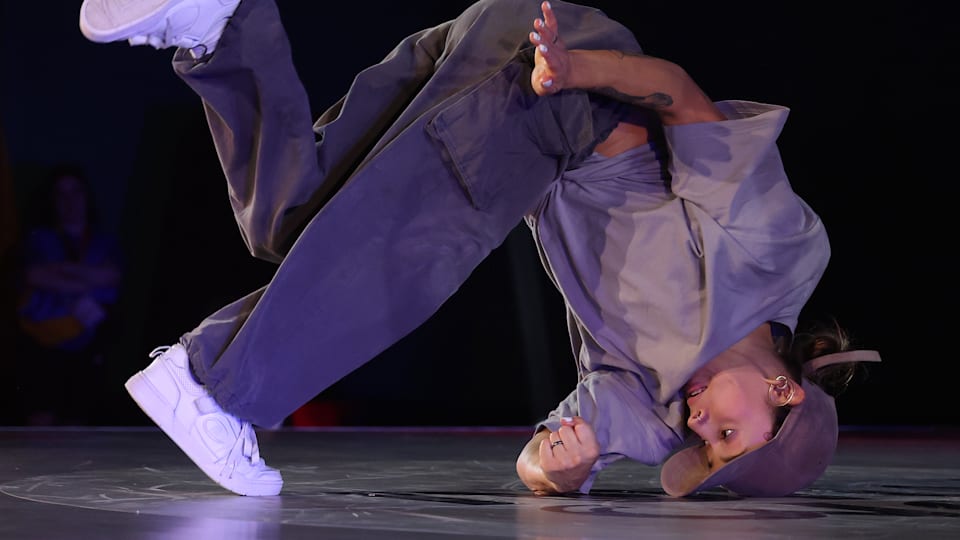B-Girl Luma: How she turned the danger of Colombian streets into her safe haven
Medellin native B-Girl Luma hid from the harsh realities of the streets when she was younger. Now she fuels off their energy and the fighting spirit of the breaking community around her. Join us on a tour of those streets with South America's top hope for the breaking competition at Paris 2024.

In Medellin, Colombia, life is lived on the streets.
This is where neighbours go to speak, argue and share the latest news.
This is also where B-Boys and B-Girls come out to show their moves, among them B-Girl Luma, who will be fighting for a chance to become South America’s only representative in breaking at Paris 2024 though the Olympic Qualifier Series in May and June.
“I love these streets,” the Olympic hopeful says, looking out the window of her family home in the hilly Manrique Oriental district of Medellin.
Her family, on the other hand, has always feared them.
Gang violence and drug trafficking made the streets dangerous. But for B-Girl Luma, the streets were the place where she practised her craft, found her community and got her drive.
“Now they respect it and understand what I do,” she said of her family’s attitude to her dancing. “But at first it was very difficult for me to ask for permission until 10 at night because often one goes late training and it was difficult for parents to understand that. But it was because they believed that perhaps the street was teaching us something else.”
B-Girl Luma, the girl from District 3
Manrique Oriental, the third district of Medellin, is where B-Girl Luma, whose full name is Luisa Fernanda Tejada, was born and raised.
Her street is narrow and steep, the road paved with cracked asphalt, small houses on either side with bars on their lower-storey windows.
B-Girl Luma climbs up the outdoor staircase to the second-floor apartment where her mother and grandmother still live. Her old bedroom window opens to a view of red brick walls, wires and rooftop patios with plastic picnic chairs. There is a hazy view of the sea further ahead.
It looks almost serene, but B-Girl Luma knows better.
“I grew up in that environment where there was a lot of noise, where many people are always in the streets," she recalled. "There are arguments between the neighbours. In fact, when I started growing up, when I was very, very young, there were some problems between gangs here on the corners.”
That violence is nothing new but stretches back decades. During the peak of gang activity in the 1990s, people would lock up indoors as early as 7 p.m. to avoid being caught in a crossfire or become a direct target.
The situation had improved by 2010 when B-Girl Luma first discovered breaking. After six months of taking free classes at the Four Elements School with Crew Peligrosos, her teachers invited her to participate in a breaking contest. Despite struggling to calm her nerves, B-Girl Luma still managed to make it to the semi-final – an achievement that inspired the young dancer to continue on this path.
It was not a typical path for someone from her neighbourhood. Her family was against her staying out late, given the ongoing street violence. B-Girl Luma was also unsure where breaking would take her.
“It’s very emotional for me to share this because it’s a part of my life that I don’t usually talk about," she said in an Olympics.com Breaking Life series. "But at some point, I also had my doubts about breaking, about dancing, because I could attend classes and it could be something I enjoy but I had to find solutions to the problems I had at home. And then, at some point I thought I’m going to quit breaking and go to work. I’m going to find another career.”
It took a family tragedy to make B-Girl Luma realise the deeper meaning breaking had for her. Just as she was deliberating leaving the sport, her cousin passed away from leukaemia.
Devastated, B-Girl Luma found that breaking was her best escape from the pain.
“Growing up, she was like a mother to me," the athlete recalled. "To see that process of her going through that at such a young age made me reconsider that I had to take advantage of time to do what really made me happy. So, even though I had my doubts about what breaking could offer me at that time, or in the future, it was being able to be happy in the moment.”
A crew and community of B-Girl Luma's own
B-Girl Luma drives through the Medellin streets on a motorcycle. She is wearing her signature gold hoops, baggy clothes and baseball cap, a tattoo of an indigenous chief peeking from under her white t-shirt sleeve.
The streets she knows so well now feature a large graffiti mural of her face with "B-Girl Luma" written next to it.
Breaking has taken the Colombian athlete to competitions around the world, including her silver-medal performance at the Santiago 2023 Pan American Games and multiple WDSF Breaking for Gold events. Through these accomplisments, B-Girl Luma has become the pride of her old neighbourhood and beyond.
“What she has done is incredible because she is the first woman and person, from my point of view, to do something so great," her friend, B-Girl Celestia said. "For the first time, Colombia is doing big things. That is something very respectable.”
B-Girl Luma makes sure to give back as well. When Covid-19 put sport competitions on hold, she returned to Medellin to reconnect with her community.
“Quarantine gave me something nice, which was reconnecting with my neighbourhood, with the people in my neighbourhood," she said. "Just that now I have other goals and dancing opened those doors for me to go to another country, to stay in another place, to live in another house.”
Whenever she is in Medellin, B-Girl Luma teaches breaking to young people. Their training ground is a building that serves as a normal school by day. Once the classes end, they can use the classrooms as a dance floor.
Bold graffiti covers the walls in the room where B-Girl Luma teaches kids to do headstands, spins and other breaking moves. When she travels, she brings back hats and t-shirts to give her students an extra boost of motivation, and share her privileges with them.
“Being a professional dancer is an opportunity that very few people here in Colombia have because many people in Colombia finish their studies thinking that they have to start working to be able to help at home, in order to be financially independent,” B-Girl Luma said. “I tried to do it after finishing high school, to continue a regular life, to have a stable job, and that’s right when I started to study breaking.”
Many of her students are also young women. B-Girl Luma understands exactly why that is.
“I feel that the reason why there may be more B-Girls in Colombia is the same reason I started breaking,” she said. “We don’t feel content, perhaps, with the opportunities offered by Colombian society. So, finding breaking in Colombia as an alternative expression for us is a way out. It is the solution to the daily routine in Colombia. It is a way of shouting what we want to express, through the body.”
B-Girl Luma (L) won a silver medal in the women's breaking competition at the 2023 Pan American Games in Santiago, Chile.
B-Girl Luma's long-awaited blessing to dance
4ESKUELA, the breaking school B-Girl Luma helps to run in Medellin, organises regular competitions for its students and the broader community.
On those nights, paint buckets and paintbrushes are brought out, fresh graffiti is applied to the walls, the floors are mopped and turntables set up. Makeshift barbeques and meat cuts are held on standby for the after-party.
B-Girl Luma is at the centre of the spotlight as she helps pull her students onto the dancefloor and gets the honours of announcing the winners.
“Hip hop saved my life and I feel that many of us in Colombia have the same thought,” she said. “We did it out of gratitude for hip hop, so this saved me because it didn’t leave me. It gave me an opportunity to be someone better, someone important."
While B-Girl Luma admits she has lost some connection with her family since she became independent, she continues to call the white-washed, two-storey building in Medellin home. And as she heads out of that house to pursue the Olympic dream, her grandmother gives her a hug and a blessing.
Once back on the sloped street next to her childhood home, B-Girl Luma joyfully does a backwards dance step.

